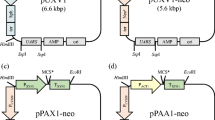Abstract
The methylotrophic yeast, Candida boidinii, was investigated as a new efficient host for heterologous gene expression. The Saccharomyces cerevisiae adenylate kinase gene (ADK1) was used as the first example for heterologous enzyme production in C. boidinii. C. boidinii cells were transformed with plasmids harboring the S. cerevisiae ADK1 gene under the alcohol oxidase (C. boidinii AOD1) promoter. The chromosome-integrant strains produced adenylate kinase protein corresponding to 22%–28% of the total soluble proteins in an enzymatically active form. When the three-copy integrative transformant was grown for 60 h on methanol-glycerol medium in a 1.5-l jar fermentor, adenylate kinase was produced intracellularly with a yield of up to 2 g/l culture medium. As the expression of the S. cerevisiae ADK1 in C. boidinii was under similar regulation to that of the C. boidinii AOD1, the previously cloned 1.7-kb AOD1 promoter fragment was proved to harbor sufficient cis elements for AOD1 regulation and found to be an efficient promoter for heterologous gene expression.
Similar content being viewed by others
References
Bradford MM (1976) A rapid and sensitive method for the quantification of microgram quantities of protein utilizing the principle of protein-dye binding. Anal Biochem 72:248–254
Cregg JM (1993) Recent advances in the expression of foreign genes in Pichia pastoris. Biotechnology 11:905–910
Cregg JM, Madden KR (1989) Use of site-specific recombination to regenerate selectable markers. Mol Gen Genet 219:320–323
Cregg JM, Tschopp JF, Stillman C, Siegel R, Akong M, Craig WS, Buckholz RG, Madden KR, Kellaris PA, Davis GR, Smiley BL, Cruze J, Torregrossa R, Velicelebi G, Thill GP (1987) High-level expression and efficient assembly of hepatitis B surface antigen in the methylotrophic yeast, Pichia pastoris. Biotechnology 5:479–485
Egli T, Haltmeier T, Fiechter A (1982) Regulation of the synthesis of methanol oxidizing enzymes in Kloeckera sp. 2201 and Hansenula polymorpha, a comparison. Arch Microbiol 131:174–175
Faber KN, Swaving GJ, Faber F, Ab G, Harder W, Veenhuis M, Haima P (1992) Chromosomal targeting of eplicating plasmids in the yeast Hansenula polymorpha. J Gen Microbiol 138:2405–2416
Gallissen G, Weydemann U, Strasser AWM, Piontek M, Janowicz ZA, Hollenberg CP (1992) Progress in developing methylotrophic yeasts as expression systems. Trends Biotechnol 10:413–417
Konrad M (1988) Analysis and in vivo disruption of the gene coding for adenylate kinase (ADK1) in the yeast Saccharomyces cerevisiae. J Biol Chem 263:19468–19474
Roggenkamp R, Janowicz Z, Stanikowski B, Hollenberg CP (1984) Biosynthesis and regulation of the peroxisomal methanol oxidase from the methylotrophic yeast Hansenula polymorpha. Mol Gen Genet 194:489–493
Sakai Y, Tani Y (1986) Formaldehyde production by cells of a mutant of Candida boidinii S2 grown in methanol-limited chemostat culture. Agric Biol Chem 50:2615–2620
Sakai Y, Tani Y (1992a) Cloning and sequencing of the alcohol oxidase-encoding gene (AOD1) from the formaldehyde-producing asporogenous methylotrophic yeast, Candida boidinii S2. Gene 114:67–73
Sakai Y, Tani Y (1992b) Directed mutagenesis in an asporogenous methylotrophic yeast: cloning, sequencing, and one-step gene disruption of the 3-isopropylmalate dehydrogenase gene (LEU2) of Candida boidinii to derive doubly auxotrophic marker strains. J Bacteriol 174:5988–5993
Sakai Y, Sawai T, Tani T (1987) Isolation and characterization of a catabolite repression-insensitive mutant of a methanol yeast, Candida boidinii A5, producing alcohol oxidase in glucose-containing medium. Appl Environ Microbiol 53:1812–1818
Sakai Y, Kazarimoto T, Tani Y (1991) Transformation system for an asporogenous methylotrophic yeast, Candida boidinii: cloning of the orotidine-5′-phosphate decarboxylase gene (URA3), isolation of uracil auxotrophic mutants, and use of the mutants for integrative transformation. J Bacteriol 173:7458–7463
Sakai Y, Goh TK, Tani Y (1993) High-frequency transformation of a methylotropic yeast, Candida boidinii, with autonomously replicating plasmids which are also functional in Saccharomyces cerevisiae. J Bacteriol 175:3556–3562
Sakai Y, Rogi Y, Yonehara T, Kato N, Tani Y (1994) High-level ATP production by a genetically-engineered Candida yeast. Biotechnology 12:291–293
Tani Y (1991) Production of useful chemicals by methylotrophs. In: Goldberg I, Rokem, JS (eds) Biology of methylotrophs. Butterworth-Heinemann, Boston, pp.253–270
Tani Y, Yamada K, Sakai Y, Vongsuvanlert V (1990) Biocatalytic and fermentative production of useful chemicals by processes using methylotrophs. FEMS Microbiol Rev 87:285–290
Tomasselli AG, Mast E, Janes W, Schiltz E (1986) The complete amino acid sequence of adenylate kinase from baker's yeast. Eur J Biochem 155:111–119
Author information
Authors and Affiliations
Rights and permissions
About this article
Cite this article
Sakai, Y., Rogi, T., Takeuchi, R. et al. Expression of Saccharomyces adenylate kinase gene in Candida boidinii under the regulation of its alcohol oxidase promoter. Appl Microbiol Biotechnol 42, 860–864 (1995). https://doi.org/10.1007/BF00191182
Received:
Revised:
Accepted:
Issue Date:
DOI: https://doi.org/10.1007/BF00191182




